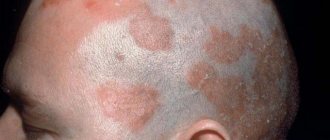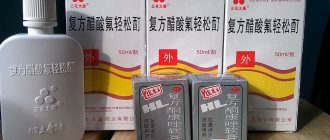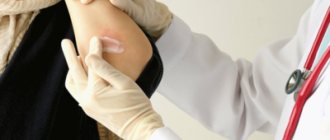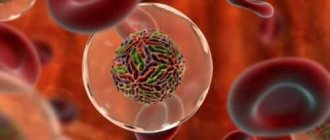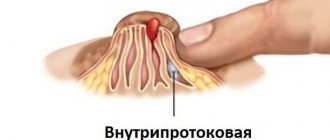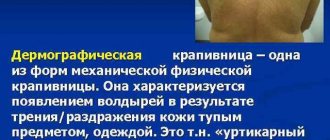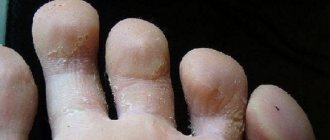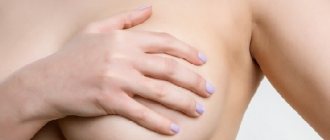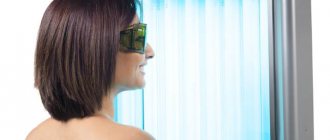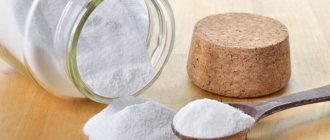Psoriasis is a chronic disease that is not yet curable, but goes into remission, periodically manifesting itself in relapses. Many patients do not always understand why a new exacerbation of psoriasis has occurred. It is important to know the main factors of acute symptoms in order to be able to eliminate or avoid them.
Sometimes psoriasis occurs in relapses
Causes of exacerbation of psoriasis
Each patient’s skin disease occurs individually, but there are certain common provoking factors and risk areas, which we will consider in more detail.
Main causes and provoking factors of relapse
The sources of exacerbation of psoriasis or scaly lichen remain not fully understood. This or that factor affects each person differently. Basically, exacerbation can develop against the background of:
- sudden emotional stress or breakdown;
- prolonged and excessive physical activity;
- viral, infectious and colds;
- changes in climatic conditions;
- skin injuries - insect bites, abrasions, wounds, burns, abrasions;
- negative reaction to medications (psoriasis relapse can occur after long-term use of antibiotics).
Some medications can trigger psoriasis
Seasonal changes in the direction of cold weather have a great influence on the occurrence of relapses of lichen planus. Ultraviolet light can suppress inflammatory processes in the epidermis during psoriasis. Therefore, lack of sunlight and tight clothing are provoking factors for exacerbation. Usually, in the spring, symptoms become acutely noticeable, and as summer approaches, the pathology subsides.
A sharp deterioration in the course of a skin disease in women may be associated with hormonal imbalances. This happens during menstruation, pregnancy, lactation or menopause.
Risk factors
In addition to the provoking causes of exacerbation of psoriasis, there are certain groups at risk of relapses. This may be a hereditary predisposition to the disease (loosening of capillaries, their significant expansion). In addition, people with disorders in the functioning of internal organs (diabetes mellitus, failure in fat and carbohydrate metabolism, liver disease) are prone to sudden and acute manifestations of scaly disease.
Constant stressful situations, ignoring sleep and rest patterns, using aggressive cosmetics for skin care and frequent contact with household chemicals, bad habits and poor diet (chocolate, coffee, spicy and salty foods) can provoke severe forms of lichen planus.
Stressful situations cause relapse of the disease
Ozone therapy for psoriasis
Ozone therapy is an event in which an ozone-oxygen mixture is taken, which has a positive effect on human systems and organs. The treatment solution has a bactericidal and antifungal effect. It also improves metabolism, strengthens the immune system, normalizes the drainage functions of the epidermis, removes toxins, enriches cells with oxygen and restores the functioning of the endocrine system. Ozone therapy is prescribed for vulgar and pustular types of psoriasis.
Autohemotherapy with ozone
Due to its immunomodulatory and anti-inflammatory properties, the mixture is effective for psoriasis. Up to 150 ml of blood is drawn from a vein from the patient, it is placed in a special container with an ozone mixture, and the enriched blood is injected back into the person.
Ozonated oil
The product is used for various skin diseases, including psoriasis. Local application of the medicine accelerates wound healing and eliminates fungal and bacterial infections. Anti-inflammatory oil is used twice a day. The procedure time is 20 minutes, and the treatment course is 30 days.
The positive effects of treatment are observed both with local treatment and on the body in general. Ozone therapy for psoriasis is used only after consultation with a specialist.
Symptoms and clinical manifestations
Relapses of psoriasis begin acutely. The areas with the driest skin are the first to be affected - feet, palms, scalp, sacral area . At this time, the main clinical manifestations of the disease can be observed:
- the formation of small red or pale pink papules with clear, rough borders;
- transformation of the rash into rough plaques of various sizes (from 1 to 10 cm or more);
- intensive formation of scales that easily peel off from the affected areas;
- the appearance of itching, pain in places where the rash is localized;
- thickening of the skin in injured areas, which is accompanied by tightness, cracks, and sometimes suppuration.
When scraping off dead epidermal cells, blood may appear on psoriatic plaques, forming small specks. These are manifestations of guttate psoriasis.
Psoriasis is characterized by scaly formations on the skin
How to distinguish from lichen
Differential diagnosis of psoriasis also includes identification with lichen planus (LP). The main differences between pathologies:
- Location: lichen is characterized by rashes on the mucous membranes and in the folds of the skin, rarely in other areas.
- Character of the rash: lichen planus, unlike psoriasis, has a darker skin color on the rash - crimson, sometimes with a dark bluish tint.
- Other symptoms: if with psoriasis itching and burning occur in severe stages, then in the case of LP these signs are observed constantly.
Pityriasis rosea, unlike LP, is contagious and spreads throughout the body very quickly. However, you can recover from it just as easily as from LLP - you just need to see a doctor in time.
Exacerbation during pregnancy
While carrying a child, a woman's hormonal levels completely change. Sometimes this serves as an impetus for long-term remission of psoriasis, and sometimes causes sudden relapses.
Also on the topic: How to treat palmoplantar psoriasis?
The symptoms of psoriasis during pregnancy are varied. Hormonal imbalance and, as a consequence, impaired synthesis of vitamin D, can cause a severe form of generalized pustular psoriasis. The symptoms of such an exacerbation are mixed, and are more reminiscent of intoxication or an allergic reaction:
- the appearance of a severe rash in the form of red plaques in the groin and abdomen, face and head, which hurt and itch;
- increased body temperature;
- nausea, vomiting;
- lack of appetite.
The provoking factor for such symptoms is an increase in the blood of cortisol, the stress hormone.
Exacerbation of psoriasis in pregnant women can lead to premature birth, miscarriage, or the birth of a low-birth-weight baby. Therefore, at the first symptoms, it is important to immediately go to the hospital.
Sometimes the disease can appear during pregnancy
Treatment of diseases with soda
The use of sodium bicarbonate is recommended to get rid of rashes on the scalp, hands, and other parts of the body. Traditional medicine advises to fight psoriasis by taking a bath with the addition of soda. The results of the manipulations are permanent relief from inflammatory processes on the skin, discomfort (itching, burning), and improved blood circulation.
Carrying out the procedure:
- Take a warm, soothing shower that prepares the skin for the procedure.
- Fill the bathtub with warm water.
- Add 450 g to the liquid. baking soda.
- Stir the solution until sodium bicarbonate is completely dissolved.
- Take a bath for half an hour.
Which doctor should I contact during an exacerbation?
During an exacerbation, you need to contact a dermatologist directly. There are not always highly specialized doctors in all hospitals, so if such a doctor is not available, you need to go to a therapist.
Squamous lichen not only affects the skin, but can affect internal organs and the musculoskeletal system. Based on the patient’s complaints, a therapist or dermatologist may prescribe additional examinations with specialists such as:
- immunologist (with a significant decrease in the body’s defenses);
- rheumatologist (joint damage);
- urologist, nephrologist (kidney pathologies);
- gastroenterologist (liver diseases).
These specialized doctors help in the complex treatment of the disease. The main therapy is prescribed by a dermatologist based on the characteristics and causes of relapse.
If the disease worsens, consult a dermatologist
Conclusion
Each study prescribed by a doctor when diagnosing psoriasis is necessary - only a complete picture of the disease will allow us to determine at what stage the pathological process is. And this is necessary for drawing up the correct treatment regimen.
An obligatory point of research is differential diagnosis - psoriasis very often has similar symptoms to other skin diseases. In some cases, a visual inspection is sufficient for a specialist. However, it is better to take another blood test or conduct a special study than to start treatment incorrectly. Indeed, in this case, you can provoke a worsening of the disease.
How long does a psoriasis flare-up last?
Psoriasis cannot be cured, but its symptoms disappear only for a certain period of time. The main thing that the doctor and the patient himself must do is to achieve the longest possible remission, during which the skin disease practically does not make itself felt.
If you neglect lichen planus, or ignore the factors and signs of its reoccurrence, then exacerbations can occur 5 to 10 times a year and last at least 15–20 days. To avoid this, you must immediately consult a doctor and follow all recommendations in the treatment and prevention of recurrent disease.
Modern strategy for the treatment of psoriasis
The generally accepted set of therapeutic measures used today has several important goals:
- Achieving fairly quick initial treatment results;
- Monitoring the effectiveness of the methods used and adverse reactions to the treatment in order to correct the therapeutic complex;
- The patient reaches the stage of stable and long-term remission.
Treatment of psoriasis for each individual cannot fit into a standard regimen; the doctor always prescribes it specifically, based on:
- types of disease;
- history of pathology;
- prevalence and severity;
- characteristics of the affected skin;
- the possibility of implementing therapeutic measures for a specific patient;
- age group and gender.
In any case, the doctor is obliged to justify each of his prescriptions, indicating to the patient the probable positive and negative ones, incl. side effects. Treatment never begins with strong drugs that are rich in side effects - they are resorted to only if the treatment has no effect, and even then not always.
What to do if psoriasis worsens?
With the next relapse of lichen planus, it is important not to self-medicate. You should immediately contact a dermatologist who will help you choose treatment taking into account the provoking factors of exacerbation.
Complex treatment includes the following methods:
- medications (ointments, injections, tablets);
- physiotherapy and diet;
- folk remedies.
The use of the Hungarian scheme helps well in the fight against scaly lichen.
Drug treatment
The basis of therapy with pharmaceutical drugs is a combination of external and internal remedies for psoriasis. First of all, the patient is prescribed ointments, lotions, creams that will help relieve the main symptoms and improve the condition of the skin.
The most effective medications for external use are Friederm, Viprosal, Anthramin ointment, Kartalin. These substances inhibit the rapid division of epidermal cells, eliminate itching, peeling, and redness of the skin.
Recedil dematotropic ointment is actively used for exacerbations. Its active components prevent hyperkeratosis. The product has a regenerating, immunomodulatory, anti-inflammatory and anabolic effect, which makes it possible to quickly suppress recurrent manifestations.
Among the external drugs that calm the immune system are Donelvin and Psorkutan. In addition, severe forms of scaly lichen are eliminated with the help of Advantan and Derovate.
Derovate is an effective remedy for psoriasis
If the use of external agents is ineffective, the therapy should be supported with tablets and injections. Mostly immunosuppressive and immunomodulatory drugs are used - Apremilast, Cyclosporine, Methotrexate.
Also on the topic: How to cure psoriasis?
In addition to medications that relieve the main symptoms of psoriasis, you need to take care of the condition of the body as a whole. A specialist knows what is best to do for this. Usually sorbents (Polysorb, Enterosgel) are added to the above medications. They help rid the body of intoxication with harmful substances. It is important to support the human nervous system. Sedative medications and antidepressants (Imizin, Parasidol) will help with this.
Important!
The duration of treatment and dose are determined by a specialist, taking into account the characteristics of the patient’s body, the nuances of the course of the disease and the factors that provoked a relapse.
Hungarian scheme
Hungarian scientists have hypothesized that the development and further exacerbation of psoriasis occurs due to a lack of bile acid in the body, which protects it from endotoxins. Experts suggest that the causes of scaly lichen may be harmful substances that are formed as a result of the breakdown of dead pathogenic microbes. The function of bile acid is to prevent the absorption of toxins into the blood.
The essence of the method is to remove pathogenic microflora from the body using a choleretic and disinfectant - dehydrocholic acid. The substance has the following mechanism of action:
- enhances the secretion of bile and promotes the conversion of bile acids;
- creatinine, electrolyte and fluid are filtered in the liver cells;
- regulation of glucose levels and increased blood flow in the liver.
The medicine also acts as a laxative and diuretic, which has a positive effect on the general condition of the body.
Dehydrocholic acid removes harmful substances from the body
Dehydrocholic acid can be prescribed in powder and capsules. The method of application and dose are the same for any course of psoriasis, its exacerbation and neglect. It is necessary to take 1 capsule of the drug with meals 2 times a day. It is best to do this in the morning and evening. The duration of treatment depends on the severity of the exacerbation of the disease and takes from 1 to 6 months.
To normalize the acidity of gastric juice and prevent bloating in the evening, you can use the powder form of the medicine. Dissolve a small amount of the substance (1/5 tsp) in 1 tbsp. l. water and take it with dinner.
Before using the Hungarian scheme, it is recommended to pay attention to its contraindications. These include diseases such as: blockage of the bile ducts, acute hepatitis, liver dystrophy, empyema of the gallbladder.
Diet during exacerbation
Nutrition plays a big role during the development of psoriasis. We will consider below what you can eat and what you should avoid. The presence of any food allergens provokes exacerbation and new rashes. Therefore, to stop relapses, it is important to adhere to a special diet.
Also on the topic: Treatment of psoriasis with folk remedies
The diet should be balanced and consist mainly of baked, boiled or stewed food. You can eat everything except the following products:
- chicken eggs;
- cow's milk (whole);
- everything spicy, fatty, salted, smoked, fried;
- mushrooms in any form (soups, sauces, fried, boiled);
- vegetables and fruits with red pigment (tomatoes, red peppers, strawberries, cherries) without heat treatment;
- harmful additives - mayonnaise, ketchup, sauces, mustard.
Quitting smoking and drinking alcohol is an important component in the treatment of psoriasis.
Eliminate mayonnaise from your diet
Physiotherapy
The fight against scaly lichen is not complete without physiotherapy methods.
They help enhance the effect of medications and quickly relieve symptoms. Among the most popular procedures are PUVA therapy, electrosleep, x-ray therapy, laser therapy, and cryotherapy. These methods are used to reduce psoriatic plaques, eliminate inflammation, itching and pain. Thanks to this treatment, the duration of remission ranges from several months to 2-3 years.
The procedures are carried out in a hospital using special equipment.
In case of exacerbation of the disease in the form of psoriatic arthritis, diadynamic therapy and magnetic therapy help well. Using such methods, you can eliminate pain and relieve inflammation in the affected joints. Treatment duration is 10–12 sessions.
Physiotherapy is important in the treatment process
Ointments for psoriasis based on solidol
On sale you can find many ointments for the treatment of psoriasis, including those based on solidol (by the way, one of the most effective, not counting hormonal ones), which one should you choose? Everything is very individual, because the composition of the drugs is different, and even the concentration of solid oil in them is not the same. Although it is called the main active ingredient, from most instructions it follows that there is at most a tenth of pure solid oil, and everything else is additional components of dubious effectiveness.
Ready-made ointments for the treatment of psoriasis based on solid oil are divided into three types according to their composition:
- Herbal – Kartalin, Markina ointment;
- Plant-mineral - Magnispor, Makeev ointment;
- Mineral – Rybakov’s ointment.
To choose the best option for yourself, it is recommended to take one course of treatment with ointments from each group and compare the effect. If there is no improvement, you can resort to treating psoriasis with pure grease or homemade ointments based on it. We will provide detailed recipes below, and begin the conversation by discussing the most popular ready-made ointments.
The standard course of treatment for psoriasis using any of the ointments listed below is 4-8 weeks; before that you should not count on a lasting positive effect. But after a week, the itching and external manifestations of the disease should decrease, and if this does not happen, then it hardly makes sense to continue using the drug - it is better to try another. All ointments are applied in a thin layer to the affected areas of the skin 1-2 times a day and are not washed off . Additional aspects of treatment can be found in the instructions for each specific drug.
For comparison, here is the composition of the most popular grease ointments for psoriasis:
SolipsorSolipsor - fatty grease, petroleum jelly, lanolin, talc, potato starch, birch tar, olive oil, pumpkin seed oil, extracts of garlic, burdock, walnut, string, calendula, birch and licorice; |
MagnipsorMagnipsor – fatty grease, mineral salts of the Dead Sea, extracts of medicinal plants, vegetable oils of sea buckthorn, pumpkin and tea tree; |
AntipsorAntipsor – fatty grease, petroleum jelly, lanolin, camphor, linseed oil, extracts of string, birch, cucumber and celandine, chitin fibers from crustacean shells; |
KartalinKartalin – fatty grease, salicylic acid, bee honey, lysozyme, eucalyptus and lavender oil, string and chamomile extracts; |
PicladolPicladol – fatty grease, lanolin, birch tar, lard, fir oil, celandine extract; |
CytopsorCytopsor – fatty grease, petroleum jelly, purified mineral oil, citric acid, castor oil, boric acid, alcoholic tincture of calendula; |
PsoriumPsorium - fatty grease, extracts of calendula, chamomile, rose hips, St. John's wort, yarrow, wheat germ, aloe, honey and beeswax, eucalyptus, cedar and sea buckthorn oils, vitamins A, B, E and D; |
PsorilamPsorilam – fatty grease, petrolatum, lanolin, stearin, zinc pyrithione, glyceryl monostearate, boric and salicylic acids; |
Psori creamPsori cream – fatty grease, petroleum jelly, lanolin, naphthalan oil, birch tar, mint and sea buckthorn oils, string, licorice, sage, milk thistle and eucalyptus extracts. |
DiprosalikDiprosalik is a Swiss drug for external use with anti-inflammatory and keratolytic effects. |
AntipsoriasisThe drug contains aqueous extracts of white birch leaves, tripartite string, greater celandine, calendula officinalis, marsh cudweed, lanolin, camphor, linseed oil, vaseline oil, medical grease. Not registered as a medicinal product. |
Folk remedies
Many patients often wonder how to quickly reduce rashes and other negative manifestations of lichen planus at home. There is no immediate result with this disease, but relief can be achieved in a short time with the help of traditional medicine. The main thing is to consult a doctor before using this or that product.
Birch tar ointment
You need to take equal parts of birch tar, sea buckthorn oil and salicylic alcohol (15 ml of each ingredient). Mix everything and apply a thick layer to the affected areas. It is recommended to wrap the top with polyethylene and leave for 1–1.5 hours, then rinse the treated areas with warm water.
The medicine is effective specifically for new rashes during an exacerbation.
Birch tar has healing properties
Celandine oil
Pour crushed fresh celandine herb (5 tablespoons) into a glass of unrefined oil and simmer over low heat for 5–10 minutes. Leave the prepared liquid to steep for 5 days.
It is recommended to lubricate psoriatic plaques with celandine oil several times a day.
Celandine is a natural remedy for the treatment of psoriasis
Laennec for psoriasis
Laennec is a new generation placental medicine. To create it, the placenta is selected to activate cellular regeneration. In dermatology it is prescribed for herpes, increased skin pigmentation, acne, dermatitis and psoriasis.
The composition of Laennec includes over 50 useful components:
- mucopolysaccharides;
- prohormone DHEA;
- amino acids with L configuration;
- enzymes;
- minerals (selenium, manganese, iron, magnesium, etc.);
- vitamins (PP, B3, B2, D, C);
- nucleic and organic acids.
Injections of the drug are made at special bio-active points, increasing its effectiveness. When administered, Laennec for psoriasis reaches the source of the pathology, eliminates it and strengthens the immune system.
Therapy for psoriasis is a balance between relieving the symptoms of the disease and maintaining the health and aesthetic appearance of the skin. At the first signs of illness, you should consult a specialist. Untimely treatment leads to exacerbation and deterioration of the patient’s condition. Only a specialist can prescribe treatment for psoriasis with medications and other auxiliary methods of traditional medicine.
Why does psoriasis appear?
Psoriasis often affects the knee-elbow areas and the scalp under the hair. The progression of the pathology can be wavy. It is not possible to cure psoriasis forever, but you can prevent the development of periods of active progression of the disease.
Often the disease develops on the scalp under the hair. The adolescent category is susceptible to this type of disease. Sometimes there is a displacement of the rash on the face. Recurrence of psoriasis on the scalp can be cured:
- tar ointment;
- salicylic acid;
- mustard mask;
- preparations based on solid oil;
- shampoos.
The most active effect on psoriatic rashes is provided by a detergent intended for hair. The pathology can be cured with the help of effective shampoos, which are listed in the table according to their categories.
| Category | Drugs |
| Antimycotic |
|
| Tar complex |
|
| Treatment category |
|
Psoriasis on the hands can be cured with the help of vitamin complexes, namely vitamin A and E. The following medications are characterized by excellent therapeutic results:
- Zodak;
- Betasalik;
- Kartalin;
- Claritin.
